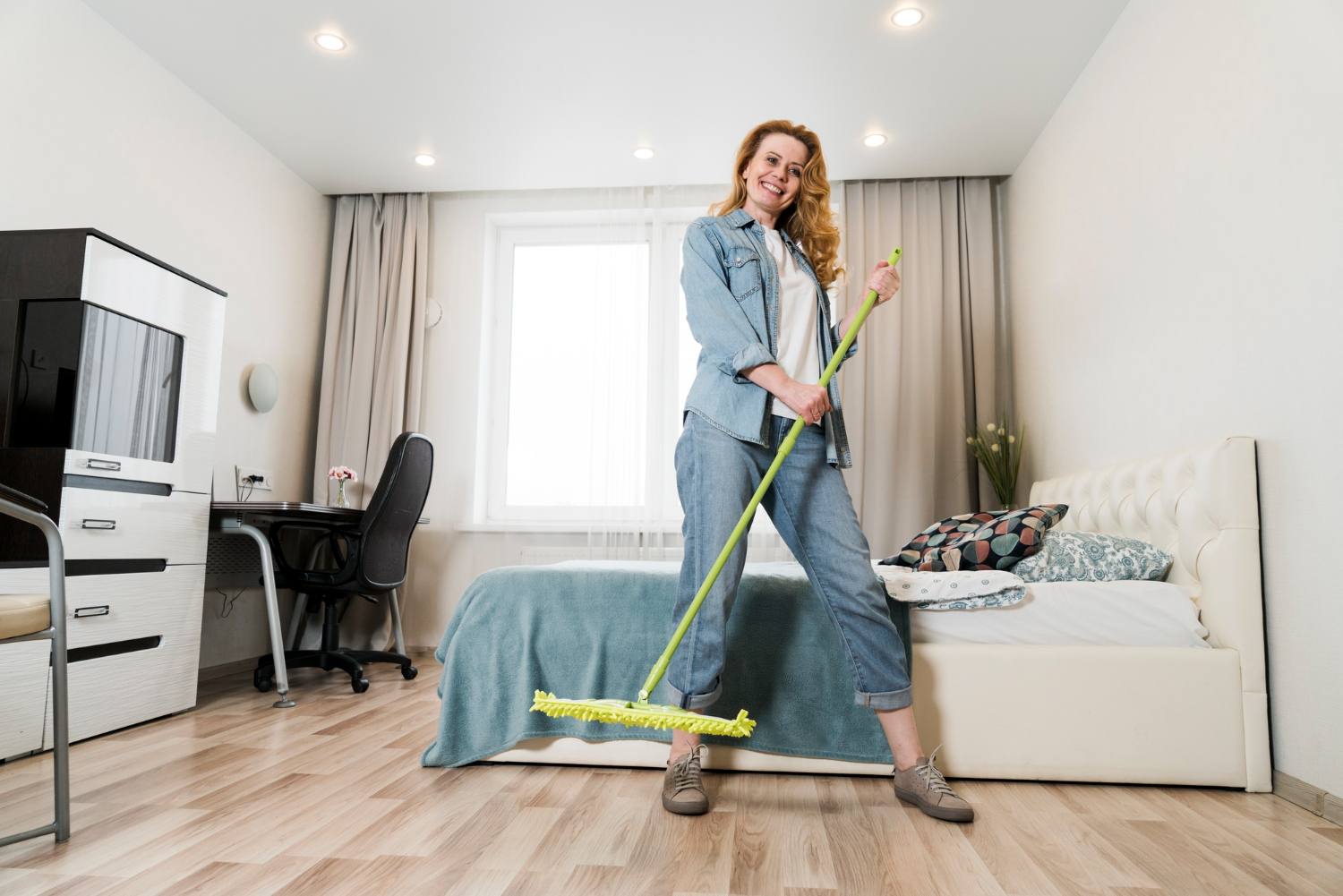When renting out furnished properties, you as the landlord have not only invested a lot in the property itself, but also in its equipment and furnishings. Most tenants appreciate this and take good care of their temporary furnished home. However, should damage occur, you as the landlord are covered by the security deposit.
In the following, we will give you an overview of the legal provisions regarding security deposits and address the following questions:
What is a security deposit?
The security deposit, also called rent deposit, is a monetary payment from the tenant to the person from whom they rent an apartment. This payment serves as security for you as the landlord in case the tenants do not fulfill their obligations under the rental agreement. This is the case, for example, if there is damage to the apartment or if the tenant owes rent.
As a landlord, you do not have to charge a deposit – you are not obliged to do so. However, it is advisable to agree on a deposit with the tenant in order to minimize the financial risk for both parties in the event of damage. Furthermore, tenants only have to pay a deposit if it is agreed upon in the rental agreement.
How much can the deposit be?
The amount of the security deposit is regulated by law. In the case of rental agreements for apartments, it may not exceed a maximum of three months’ rent (§ 551 Para. 1 Sentence 1 BGB). This refers to the net rent. Advance payments for additional costs or furnishing surcharges should not be used when calculating the deposit.
In the case of temporary furnished rentals, as with Wunderflats, all-inclusive rentals are often used. This already includes a flat rate for additional costs and a furnishing surcharge. In this case, too, the deposit should be based on the basic rent.
Who owns the deposit?
The money from the security deposit always belongs to the person renting. This is true even if the tenants transfer the money to the account of the person from whom they rented the apartment.
As a landlord, you are obliged to invest the deposit separately from your personal assets (§ 551 Para. 3 Sentence 3 BGB). This means that the money remains protected even in the event of insolvency. The tenants are also entitled to the interest from the investment of the deposit.
What forms of the security deposit are there?
The security deposit is usually a cash deposit. However, there are also other forms in which tenants can pay the security deposit. Generally, several forms of security deposits may be mixed, but the total amount may not exceed three net rental amounts.
The tenants can pay the deposit to you as the landlord in the following ways:
Cash deposit
A cash deposit means that the tenants transfer the money to you or hand it over in cash against a receipt. It is the most common form of deposit, especially for temporary furnished rentals.
The law provides that the money from the deposit is invested (§ 551 Para. 3 Sentence 1 BGB). We will explain below which forms of investment are available. Alternatively, you can agree with your tenants to waive the interest. However, this should be explicitly stated in the rental agreement.
Guarantee
If you agree, your tenants can provide a guarantee for the amount of the deposit instead of a cash deposit. In this case, no cash is handed over or transferred. Instead, the person or institution providing the guarantee undertakes to assume financial responsibility for the tenant up to the amount of the deposit in the event of loss of rent or damage.
In the case of a private guarantee, private individuals act as guarantors. For students, for example, this is often the parents. In the case of a bank guarantee, also known as guaranteed credit or rent guarantee, the tenant’s bank acts as guarantor. The declaration of suretyship, i.e. the guarantor’s declaration of commitment, must be in writing (§ 766 Para. 1 Sentence 1 BGB).
Security deposit insurance
With security deposit insurance, an insurance company initially pays the deposit. In return, the tenants pay a fixed annual premium. Security deposit insurances are intended for unlimited rental agreements. They are not offered for fixed-term agreements such as temporary furnished rentals.
When must the deposit be paid?
If a deposit has been agreed upon with the tenants in the rental agreement, it is due at the beginning of the rental relationship.
By law, tenants are allowed to pay the deposit in installments within a maximum of three installments. The first installment must be paid at the beginning of the tenancy. The other two installments must follow along with the next two rent payments, i.e. usually at the beginning of the second and third month of rent (§ 551 Para. 2 Sentence 1 BGB).
However, in the case of temporary furnished rentals, installment payments are rarely used, as the rental agreements are usually not longterm. In addition, tenants do not incur moving or renovation costs when moving into a furnished apartment. They are less like to have significant financial burdens in connection with renting the apartment that would make it necessary to pay in installments.
Can the deposit also be paid to Wunderflats?
The rental agreements that come about through Wunderflats are concluded directly between landlord and tenant. The tenants always pay the deposit to the persons from whom the apartment is rented – to the landlord.
Wunderflats is not a party to the rental agreements. Therefore, the deposit can neither be transferred to Wunderflats nor refunded by Wunderflats to the tenants.
What happens to the deposit during the rental period?
Unless you have stipulated a waiver of interest in the rental agreement, you as the landlord are legally obligated to invest the deposit. This investment must bear interest at the usual rate (§ 551 Para. 3 Sentence 1 BGB). You do not have to search for the best possible investment.
The following options are available for the investment:
Security deposit account
Many banks offer special interest-bearing security deposit accounts. These are trust accounts to which creditors have no access in the event of the insolvency of the person letting the property. Such a security deposit account is usually set up by you as the landlord. After the end of the tenancy, the tenants receive the money in the account back, including any interest that may have accrued, provided that there are no outstanding claims on your part.
Security deposit savings account
Tenants can invest the deposit in a deposit savings book. They then pledge the savings book to the person from whom they rented their apartment. In return, they either hand over the physical savings book or assign all claims to you as the landlord. In this way, you as the landlord have access to the deposit in the event of a claim.
Alternative forms of investment
If both parties agree, you can also choose another form of investment for the security deposit, such as a call money account or a securities account. This may yield a higher return, but also involves the risk of making a loss. As the landlord, you do not have to compensate for such a loss if the tenants have agreed to this form of investment in writing.
What can the deposit be used for?
The deposit serves you as a landlord as security for damages from the current tenancy. In particular, in the following cases, you can offset the costs you incur against the deposit after the end of the tenancy.
Please remember: During the tenancy, you cannot use the deposit to cover ongoing costs. This is only possible after the tenant has moved out.
Damage to the apartment and furniture
Damage to the apartment and furniture caused by improper use must be repaired by the tenant. This includes, for example, burn holes, red wine stains on the sofa or cracked tiles. If the tenants do not comply with this obligation and you, as the landlord, take care of the damage after they have moved out, you can offset the costs incurred against the deposit.
Tenants only have to pay for normal repair costs. If the repair would be more expensive than the new purchase, for example, for furniture or appliances, a new purchase is justified. However, the tenants do not have to bear the costs for an upgrade – For example, if a parquet floor is installed instead of a laminate floor with numerous burn holes, or a designer piece is purchased instead of a shelf from the hardware store.
Tenants do not have to pay for the removal of normal signs of wear and tear, such as slight limescale marks in the shower or light scratches in the parquet flooring or on the seat of a chair. Consequently, the security deposit cannot be used for this purpose either.
Please remember: Claims arising from damage become invalid after six months. After the tenants have moved out, the damage they caused should be repaired as quickly as possible and they should be invoiced for the repair costs. This is to avoid a statute of limitations on your claims as far as possible.
Missing furnishings
If furnishings that were rented together with the apartment are missing, the tenants must replace them. If they do not, you can offset the cost of it against the deposit.
A missing item of furniture must only be replaced by an item of the same type and quality. As a landlord, you have no right to have the missing item replaced with a new item of higher quality.
We recommend that you keep an inventory list and check it is complete when you hand over the apartment to your tenants and again when they move out. This way you can easily determine which furnishings are missing. Here you can download our practical inventory list template.
Excessive consumption of consumption-based service charges
If you as a landlord have agreed with your tenants on a lump-sum settlement of service charges, as is the case when renting out furnished apartments on a temporary basis via Wunderflats, all costs for the consumption-dependent service charges are actually covered by the rent payments. The risk of a lack of cost coverage by the all-inclusive rent is normally borne by you as the landlord. The tenants are obliged to avoid excessive consumption that exceeds the usual level on which the flat rate is based.
In order to issue a subsequent invoice for additional costs, there must be significant additional consumption that far exceeds the average consumption of recent years. The Oldenburg Regional Court, for example, found this to be the case for a tenant who had consumed three times the amount of electricity on which the flat rate was based. It should be noted here that the additional claim is not a settlement of the additional costs, but a separate claim for damages, the conditions for which must be met in each individual case.
Thus, if you find such significantly higher consumption in consumption-dependent additional costs such as electricity or heating, you may be able to withhold an appropriate amount of the deposit until the next additional cost settlement. This amount must be settled when the actual costs are determined. You cannot withhold the entire deposit in this case.
For more information on the billing of consumption-based service charges, please see our article on the legal situation when renting out furnished accommodation on a temporary basis.
Increased cleaning costs
In the Wunderflats rental agreement, you have usually already agreed on a final cleaning fee, which covers all cleaning costs after the tenants move out.
Only in exceptional cases, if the tenants leave the apartment in an extremely dirty condition when they move out, you may be able to offset the additional cleaning costs against the deposit. In this case, the level of filth must far exceed the usual extent.
Please keep in mind that the tenants have to hand over the apartment broom-clean only. What broom-clean means is not defined by law. According to a ruling of the German Federal Court of Justice (Bundesgerichtshof): “The obligation to return the rented apartment ‘broom-clean’ is limited to the removal of coarse soiling” (AZ VIII ZR 124/05). The apartment must therefore be swept or carpets vacuumed, any adhesive residue on windows and coarse lime scale deposits in the bathroom and kitchen have been removed and the garbage has been disposed of. Normal signs of use, such as lime stains on the tiles, on the other hand, are part of the normal final cleaning, which is the responsibility of the landlord.
Rent arrears
If contrary to expectations, your tenants have not paid the rent or have not paid it regularly, you can offset these outstanding claims against the deposit after the end of the tenancy.
However, tenants are not allowed to wear out the deposit and not pay any rent at all in the last few months. The deposit is primarily intended to serve as security in the event of damage. This is no longer possible if the deposit has already been used up by the missing rent payments of the last months of rent.
By when must the deposit be repaid?
As a landlord, you are entitled to a reasonable period of time after your tenants have moved out to check whether there is any damage to the apartment, whether there are rent arrears or whether there is a significant increase in consumption of utilities. Exactly how long you may need for this is not regulated by law. Courts regularly assume a period of two to six months to check the damage and have it repaired. Only then must the deposit be returned. Remember, however, that claims arising from damage become invalid after six months.
If you expect additional payments for consumption-based service charges, you can retain an appropriate amount from the deposit until the next service charge settlement. This amount will then be settled when the actual costs have been determined. Only in this case is a resulting repayment permitted more than six months after your tenants have moved out – but no longer than one year later. The rest of the deposit must be paid back to the tenants by the usual deadlines.
When your tenants move out of the apartment, it is best to discuss with them at the apartment handover when they can expect the return of the deposit. At this point, you will already know if there are any obvious damages that could delay the return of the deposit.
How do I proceed in the event of damage?
Handover protocol at the handover of the apartment
We recommend that you keep a handover protocol when your tenants move in and out during the handover of the apartment. In it you can document the condition of the apartment and the furniture. This will help you to identify any damage caused during the tenancy when your tenants move out. You can find our practical form for the handover protocol here.
Pay particular attention to possible damage when handing over the apartment when your tenants move out. In the case of damages that you only notice after handing over the apartment, it must first be proven that they were caused by the last tenants. Therefore, it is usually only possible to offset damages that are discovered later against the security deposit in exceptional cases, for example, in the case of mould.
Here you will find more tips for a smooth handover of your apartment.
Repairing damage
If you notice damage when handing over the apartment, talk to your tenants about it immediately. If the tenants have caused damage, you can either ask them to repair the damage or you can repair the damage yourself and then claim back the necessary costs. In the first instance, the tenants must be given a reasonable period of time to repair the damage. As a rule, you should give them at least two weeks to do so. Clear communication with the tenants is important. This also applies if your tenants have rent arrears. Give them a reasonable period of time to pay the outstanding rent.
If the tenants do not repair the damage despite being requested to do so, or if you wish to take care of the repairs yourself, you can use the security deposit to cover your costs in the cases described above. You can then retain the deposit until the repair work has been completed or the additional costs have been settled, but for no longer than six months or one year respectively.
Deposit repayment if there is no damage
If after inspection there are no damages in the apartment or the identified damages have been repaired by the tenants, and there are no rent arrears, then transfer the deposit back to your former tenants in full, including interest, promptly after the apartment has been vacated.
Repayment and settlement of the deposit
If you, as the landlord, have carried out repairs yourself or purchased missing furnishings, transfer the remaining credit from the deposit to your tenants after the work has been completed.
Also, provide them with a statement of account for the security deposit: In it, list all items that you have paid from the deposit credit, such as repairs incurred, furnishings replaced, or outstanding rent payments. Communicating openly about the repayment of the deposit usually saves a lot of questions.
We are here for you!
If you rent out your furnished apartment on a temporary basis through Wunderflats, we will be happy to support you and, for our part, seek dialogue with the tenants in the event of any disagreements. Please contact us at service@wunderflats.com.

Please note: The contents of this page have been prepared for your information and the law firm Heuking Kühn Lüer Wojtek has been commissioned to check the legal correctness of the German version of this article. However, this posting does not replace legal advice. For legal advice in your specific case, please contact a law firm. With more than 400 lawyers, tax advisors and notaries at eight locations in Germany, the law firm Heuking Kühn Lüer Wojtek can quickly help you. Contact Dr. Marcus Georg Tischler, our Wunderflats contact person on site. He will connect you with the appropriate expert in the law firm who will take care of your individual concern when you submit a request.










